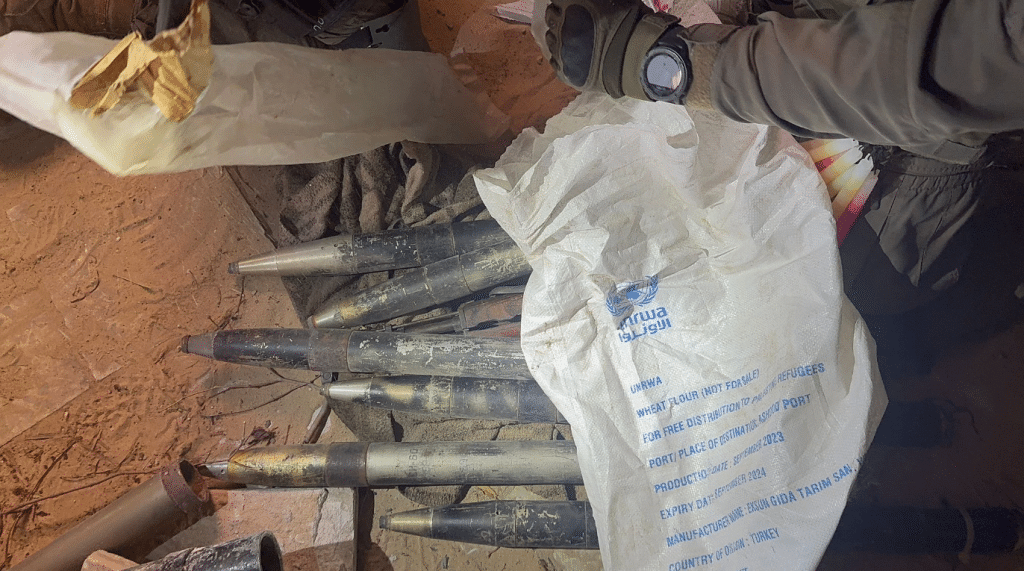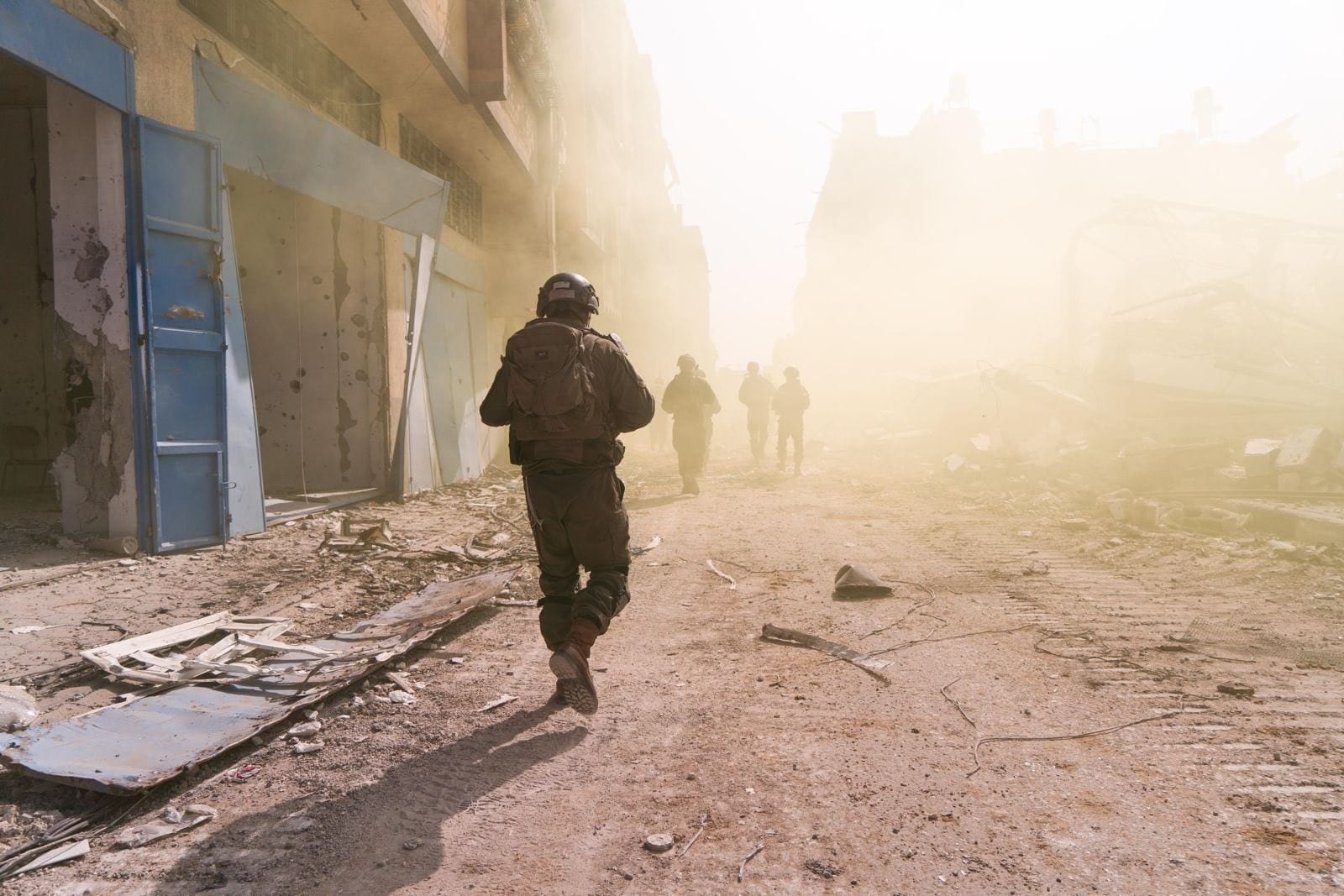
Account of the main events in the Israel-Hamas war and hostilities by the Iranian Axis
Overview
- US President Joe Biden emphasized the need to “end the suffering of Palestinians” in the annual State of the Union address. Vice President Kamala Harris for the first time called for an immediate ceasefire.
- Biden said that the US would create a naval port next to Gaza to deliver humanitarian aid. This port would be operated by the US military and be able to receive large shipments of water, medicine, and temporary shelters.
- Biden challenged the Israeli leadership directly to make humanitarian assistance to Gazans should be the primary consideration for the IDF and that aid should not be used to pressure Gaza. He again stated the only possible solution is a Two-State Solution.
- This week COGAT published statistics that demonstrate that more trucks carrying aid enter Gaza now than any time before October 7.
- Israeli security officials advised Prime Minister Benjamin Netanyahu and members of the security cabinet to swiftly sign a letter committing to the use of American weaponry, as requested by the Biden administration. This letter stipulated that any use of American arms in Gaza must adhere strictly to international law and that Israel must facilitate and not obstruct humanitarian aid to Gaza, whether provided directly by the US or supported by it. The Biden administration seeks to receive the signed letter by mid-March.
-
The IDF forces located a weapons warehouse near a school that serves as a shelter for the citizens of the Gaza Strip. The fighters located another munitions warehouse in the heart of a civilian neighborhood, dozens of warheads for rockets, cartridges and ammunition were seized in the warehouse, some of the munitions were disposed of in UNRA sacks | Credit: IDF Spokesperson - The Hamas delegation left Cairo to discuss the negotiations concerning the freeing of hostages with the Political Bureau in Qatar. So far Hamas has toughened its stance and made unreasonable demands like only releasing the first batch of hostages after a week of ceasefire.
- According to media reports, Hamas leader Yahya Sinwar plans to instigate more violence during Ramadan throughout Israel and Judea and Samaria. He has expressed that it is not in Hamas’ interest to reach a cease-fire deal during Ramadan. Hamas and other Palestinian factions are calling for Jihad during Ramadan, capitalizing on the religious sentiment that brews during this time in the Muslim calendar.
- IDF chief of Staff Herzi Halevi has instructed the IDF to prepare offensive plans for an extended war in the North.
- The mediation with Lebanon has failed; American envoy Amos Hochstein and his representative in Beirut have left the Middle East and announced the suspension of all talks related to a ceasefire. Hezbollah is preparing for war; they are aware of the discourse in Israel, aware of the IDF’s preparations, and all that remains is for each side to calculate when the right time is to engage in conflict.
- The UAE received Israeli approval to start aid shipments via the naval corridor from Cyprus. Mohammad Dahlan is seen as the mastermind behind the Emirati aid operation.

International
- UNRWA General Commissioner, Philippe Lazarini, stated that UNRWA is “in mortal danger” after a series of donors withheld their funding following accusations that its employees participated in Hamas’s attack on October 7th.
- The first discussion at the UN on Hamas’s use of sexual violence as a military tool is scheduled to take place next week. The Security Council will convene after a report that includes evidence of sexual violence was published by Pramila Patten, the UN Deputy Secretary-General serving as the special representative of the Secretary-General on sexual violence in conflict zones.
- High Representative of the European Union for Foreign Affairs and Security Policy, Joseph Borrell, issued a statement in response to the aid truck tragedy last week, falsely stating that Israeli firing at over a hundred desperate civilians attempting to reach food is unjustified, with no evidence. Borrell further called for an international investigation to provide a clearer picture of the event. It was further noted that Israel must take responsibility, adhere to international legal principles, and protect the principles of distributing humanitarian aid to civilians, and that continuous fighting and blatant disregard for laws could lead to absolute chaos, completely ignoring that statement of IDF Spokesman Daniel Hagari that “No IDF strike was conducted towards the aid convoy”
- Volker Türk, United Nations High Commissioner for Human Rights said that Israeli settlement expansion is a war crime and endangers the establishment of a Palestinian State.

- Britain’s Foreign Secretary, David Cameron, stated that the establishment of a port in Gaza “will take time” and called on Israel to open the port of Ashdod for the benefit of the Gazans. According to him, the opening of the port in Israel is “essential” to assist in resolving the humanitarian crisis in the Gaza Strip.
- Canada is planning to renew funding to UNWRA weeks after suspending donations due to findings that its employees were involved in Hamas attacks on October 7th. According to CBS, the Canadian government is planning to proceed with a planned payment of 25 million Canadian dollars (18.5 million USD) in April. If approved, Canada would the first country to lift the freeze on funding to UNRWA. So far 16 countries have frozen $450 million in funding to the UNWRA.
- Spain has committed an additional €20 million in aid to the UNWRA. In a meeting between the Spanish Foreign Minister, Jose Manuel Albares, and the UNWRA Commissioner-General, Philippe Lazzarini in Madrid, it was announced that the assistance would be in addition to the €3.5 million that his country already pledged in February.
- Turkish President Recep Tayyip Erdogan stated that his country stands “steadfast” behind Hamas leadership and affirmed that Hamas is not a terrorist organization. “No one can lead us to say that Hamas is a terrorist organization. Turkey is a country that openly communicates with Hamas leaders on everything, and stands firmly behind them,” he declared.
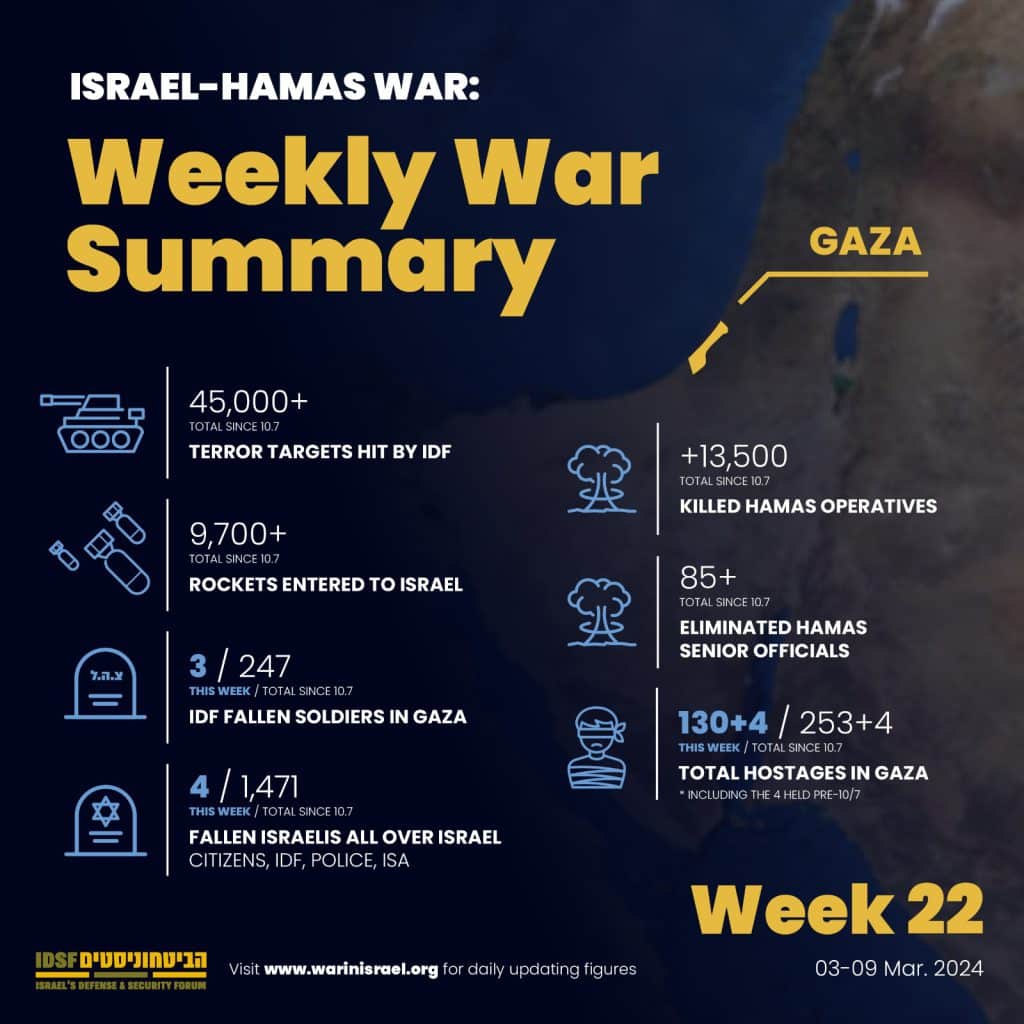
Gaza Strip
Diplomatic
Biden’s Plans for Humanitarian Aid and his State of the Union Speech
US criticism and impatience with Israel reached a new level this week and was apparent by the tone of a US official as quoted in the Guardian “We’re not waiting on the Israelis anymore. This is a moment for American leadership”.
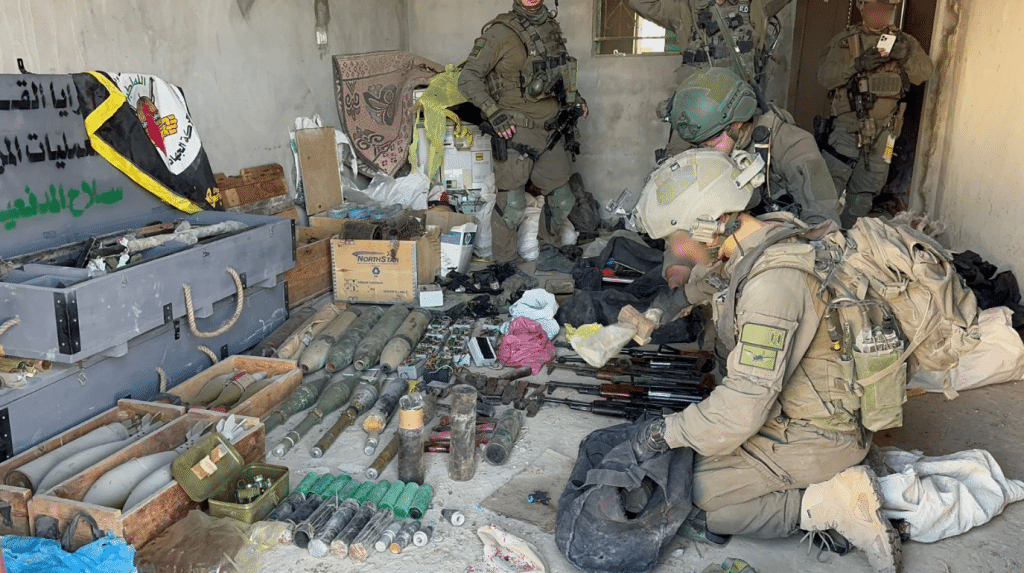
It started when Biden and members of his administration made comments that they are unsatisfied with the way Israel is distributing humanitarian aid in Gaza. Biden addressed the situation in Gaza in his State of the Union speech and emphasized the need to end the suffering of Palestinians. Vice President Harris for the first time called for an immediate ceasefire. Biden said that the US would create a naval port next to Gaza to deliver humanitarian aid. This port would be operated by the US military and be able to receive large shipments of water, medicine, and temporary shelters. The construction of such a port could take 45-60 days. US and its allies are planning to meet in Cyprus to discuss plans for the port. The port would not solve the main issue of distributing the aid to those who need it; nor will it prevent Hamas and local gangs from stealing and hoarding it.
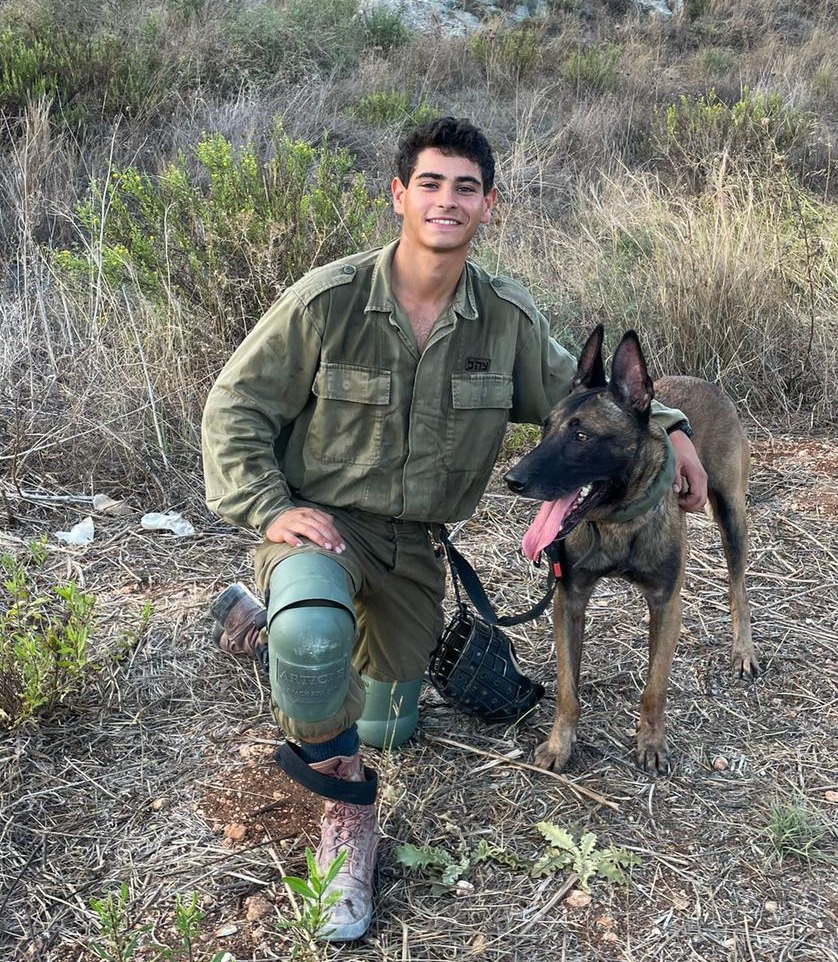
The US wants Israel to secure that passage of aid to the shore in Gaza which would mean putting IDF soldiers as sitting duck targets for the terrorists. This approach is likely to cause more friction between the US and Israel in the upcoming weeks.
This announcement comes after the US airdropped humanitarian aid via planes which killed 5 Palestinians due to faulty parachutes. Biden explained that Israel would be responsible to secure the port that the US is planning. After his State of the Union speech Biden was caught on camera telling a senator that he plans to have a hard talk with PM Netanyahu “Come to Jesus meeting” over the Gaza situation.

Biden and his team seem to be responding to the false narrative that Israel is preventing humanitarian aid from coming into Gaza. He said, “Israel must do its part. Israel must allow more aid into Gaza and ensure humanitarian aid workers are not caught in the crossfire”. This week COGAT published statistics that show that more aid trucks enter Gaza now than before October 7. Moreover, much of the aid is stolen by Hamas and their remain difficulties is in using non UNRWA distribution mechanisms for the aid. The narrative that Israel starves the population and prevents food from coming in was evident in Biden’s speech where he insinuated that Israel is using aid as a bargaining chip. He addressed the Israeli leadership directly in his speech and said that humanitarian assistance cannot be a secondary consideration and cannot be used to pressure Gaza. He re-iterated that the only acceptable solution to the US is a Two-State Solution.
To put things in perspective, Biden did speak about the horrors done by Hamas including the allegations of sexual violence that had been confirmed by the UN. Biden said that his priority is getting a hostage deal to release the remaining hostages held by Hamas. In the audience there were family members of the American Israeli hostages held by Hamas.
Biden has framed his approach that he wants to help Israel take care of itself and that he is a friend of Israel and therefore Israel should listen to him regarding the Two-State Solution. “As a lifelong supporter of Israel, my entire career, no one has a stronger record on this than I do…There is no other path that guarantees Israel’s security and democracy.”
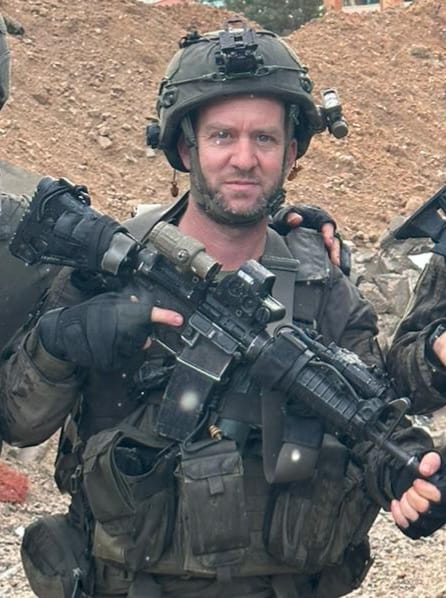
Biden’s Change of Tone
During a recent discussion, senior Israeli security officials advised Prime Minister Benjamin Netanyahu and members of the Security Cabinet to swiftly sign a letter committing to the use of American weaponry, as requested by the Biden administration. This letter, sent two weeks ago, stipulates that any use of American arms in Gaza must adhere strictly to international law and that Israel must facilitate and not obstruct humanitarian aid to Gaza, whether provided directly by the US or supported by it. The Biden administration seeks to receive the signed letter by mid-March, with Secretary of State Blinken required to update Congress by March 25; failure to provide this commitment could result in the suspension of weapon deliveries to Israel.
Israeli officials emphasized to the Security Cabinet that while the Biden administration currently views the Israeli signature as a technical matter, any delay in signing could transform the issue into a political concern. Defense Minister Galant proposed himself as the signatory for the commitment letter during the discussion, but no decision was made. Further consultations on the matter are anticipated to occur this week, reflecting the complex diplomatic considerations involved.
The demand for a written commitment stems from a new National Security Memorandum issued by the White House, focusing on the accountability of countries using American arms. This memorandum, issued on February 8, applies globally but holds particular significance for Israel amid the ongoing conflict in Gaza. The policy mandates that countries using American weaponry provide written assurances of compliance with international law and commitment to facilitating humanitarian aid. Failure to provide such assurances within 45 days of the memorandum’s publication could lead to the suspension of American weapon shipments to the respective country.
The White House is seeking a full accounting of the government’s weapons assistance to Israel as it asks for lists of weapons from the Pentagon and the State department amid criticism and internal political pressure. A source with direct knowledge of the issue claimed the White House request was routine and was in practice with U.S. military assistance to Ukraine, and the White House’s aim is to get a status update of defense export licenses that are pending and arms transfers that are in the pipeline
- Pro-Palestinian advocates such as the UN Special Rapporteur on the Right to Food, Michael Fakhri, who supposedly want to help the humanitarian situation in Gaza oppose Biden’s plans as they say it would legitimize the continuation of the war. The narrative that is propagated on Pro Palestinian channels is that it is more important to stop arming Israel even over delivering aid to Gaza.
- A group of more than 30 House Democrats sent a letter to Biden saying that an Israeli invasion of Rafah could violate requirements that U.S. military aid be used in accordance with international law.
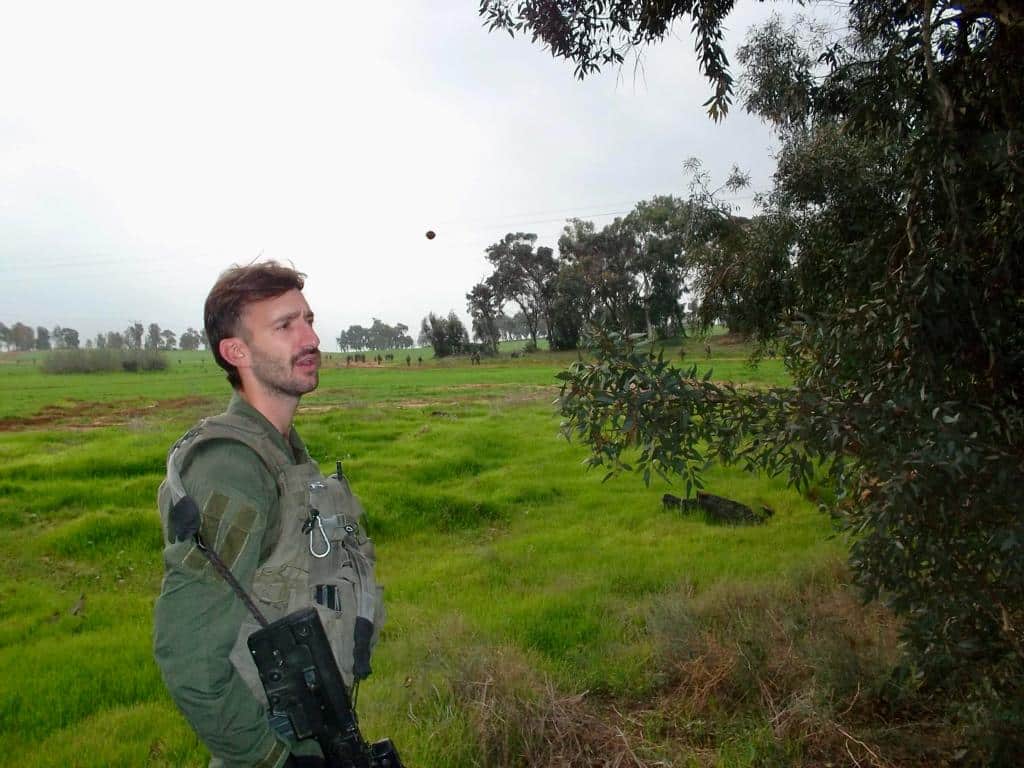
Minister Gantz’ trip to Washington
One of the notable political developments in the war is the internal rift between MK Benny Gantz as Prime Minister Netanyahu’s main political rival who also serves as a cabinet minister and Netanyahu’s prewar government. Gantz made a trip to meet US officials in Washington including Vice President Kamala Harris, Secretary of Defence Lloyd Austin, and US National Security Advisor, Jake Sullivan. The trip was not approved by Netanyahu who was upset by it and said, “Israel has only one Prime Minister.” This relationship between Gantz and US officials may signal that the US might plan to find other back channels to the Israeli government through more cooperative and pliable ministers that are more cooperative to the American administration. When asked about concerns that the US intervenes in domestic Israeli politics, National Security Council Spokesman John Kirby said that the US did not invite Gantz, but Gantz wanted to meet with them. This trip cannot be seen independently from the US’s changing tone on Israel and could be part of a strategy to influence Israel through alternative means as Netanyahu is seen as uncooperative and is reported to be at odds with Biden. It is important to note that during the same time as Gantz’s visit, Mohammed bin Abdulrahman Al Thani, Minister of Foreign Affairs and Prime Minister of Qatar, met US Secretary of State Blinken.
Gantz later flew to the UK where he met with the Prime Minister, Rishi Sunak, Secretary of State for Foreign, Commonwealth and Development Affairs, David Cameron and UK National Security Advisor, Tim Barrow.
The Hamas Hostage Deal
The US through various officials says it supports the reported formula for the hostage deal that had been reached. Israel accepted it and the US understands that Hamas is responsible for its failure as it has refused to budge from its unrealistic demands.
Hamas’s starting position is for the IDF to retreat from Gaza, allow aid to enter Gaza, allow Gazans to return to their homes in the north, and get international assurances that Israel would not continue the war. Hamas officials like Osama Hamadan have declined to provide information about the hostages without Israel paying a price in exchange.
US ambassador to Israel, Jack Lew, said at the INSS conference that the hostage negotiation talks are not dead despite what some people might assume. The Hamas delegation left Cairo to discuss the negotiations with its Political Bureau in Qatar. So far Hamas has toughened its stance and has made unreasonable demands like releasing the first hostages only after a week of a ceasefire.
The interlocuters planned that the beginning of Ramadan, on March 10th would be the target date for a deal. So far, it appears that Hamas’s strategy has been to diminish Israel’s international reputation by planning more chaos and havoc during Ramadan. According to reports, Sinwar plans to instigate more violence over Ramadan throughout Israel and Judea and Samaria and that it is not in Hamas’ interest to reach a cease-fire deal during Ramadan.
- Director of the Mossad, David Barnea, met secretly with the head of the CIA, William Burns, to discuss efforts to reach a deal for the release of the hostages held by Hamas in Gaza. Burns briefed the Mossad head on his recent talks in Egypt and Qatar regarding the negotiations over the past two days. “Hamas is striving to set fire to the area during Ramadan at the expense of the Palestinian residents of the Gaza Strip,” the Israeli Mossad Chief said in a rare statement that confirmed the meeting between Burns and Barnea.
- The spokesman for Hamas’ military wing, Abu Ubaida, called on Friday for the month of Ramadan to be an escalation of the “Flood of Al-Aqsa”.
- The return of Palestinian civilians to northern Gaza is a top priority for Hamas in the negotiations and one of the main sticking points in the talks, according to sources with direct knowledge. This may be so since Hamas knows that a return to north Gaza would allow it to reconstitute its destroyed battalions.
Other
- The UAE received Israeli approval to start aid shipments via the naval corridor from Cyprus. Mohammad Dahlan is being credited as the mastermind behind the Emirati aid operation which could also position him as a potential political kingmaker in Palestinian politics in the day after the war.
- The European Union announced on March 8 that it is planning to open an emergency maritime aid corridor from Cyprus to the Gaza Strip sometime next week as part of a joint effort with its allies, including the United States.
- The US still has not given the “green light” for an Israeli ground operation in Rafah as it did not see a credible plan to evacuate the 1.4 million Gazans sheltering in the region.
- IDF spokesperson, Rear Admiral Daniel Hagari unveiled recordings of UNRWA teachers who participated in the October 7th massacre including looting and kidnapping of women. IDF has evidence of over 450 UNRWA employees who were active in Hamas and PIJ military branches.
- Sky News in Arabic sources say that there is mounting criticism from Hamas ranks on Sinwar’s decision to start the war without consulting other Hamas leaders. The decision was made by Sinwar, his brother, Mohammad Deif and Marwan Issa.
Operational
On March 3rd, the divisional operation in Zaitun that started on February 20th ended successfully-as the IDF raided Hamas apartments, found rocket launchers, weapons, tunnel openings and weapon production facilities. Over 100 terrorists were eliminated and dozens were apprehended.
Currently there are 3 main centers that the IDF is focusing on conquering and clearing in southern Gaza- Abbasan el Kabir, Al Qarara and Hamed neighborhood in Khan Younis.
- Over 250 Hamas and PIJ terrorists have been apprehended in the past days in the Hamed neighborhood in Khan Younis bringing the number of terrorists captured from the Khan Younis area to 1,500 since December. These terrorists are interrogated by Shin Bet and the IDF’s Unit 504.

- The IDF deployed the Netzah Yehuda battalion to Bet Hanoun in northern Gaza to fight resistance pockets of terrorists that have increased their attacks against IDF troops.
- The Givati Brigade is operating in western Khan Younis and has caught and killed many terrorists in the luxurious Hamed neighborhood that was used by top Hamas officials. Civilians from Hamed neighborhood were asked to evacuate to the humanitarian corridor in El Mowasi or Dir el Balach. 80 terrorists who joined the masses were apprehended.
- According to the Institute for the Study of War, the IDF reports that the Al Qarara Hamas battalion in the Khan Younis area is dismantled are incorrect. There are indications that the battalion maintains an operational command.
Domestic Arena
Recruitment of Ultra-Orthodox
Defense Minister Yoav Gallant has said that he would not support a bill regarding the issue of military draft that is not agreed upon all coalition partners (insinuating Gantz would have to agree). Gallant and IDF chief of staff have called for a draft for everyone including the ultra-orthodox who currently receive exemptions from mandatory military service. The issue of exempting Ultra-Orthodox from military service is an unsolved issue that has led to the dissolution of previous governments. In fact, the Supreme court has ruled that the draft exemption is unconstitutional and has given the Knesset an extension to amend the bill.
Netanyahu is between a rock and a hard place- he it appears that he cannot appease both his Ultra-Orthodox coalition partners, as well as Gallant and Gantz on which his cabinet relies on. In addition, Netanyahu whose poll numbers are very low, cannot afford an election, which is exactly what will happen if his government collapses.
More importantly, the Attorney General, Gali Baharav Miara, under her role as the government’s representative in court, told the Supreme court that if no legislation is brought forward by April 1st, the state would have to draft Ultra-Orthodox men. This is a potential hurdle for the government that could cause political instability in the cabinet and potentially topple the government if a consensus is not reached.
This issue came back to the headlines after the IDF reported that it plans to extend mandatory service and the age for reserves as the security burden falls on a smaller portion of the population. Many Israelis are protesting the government and are calling for early elections while Netanyahu is blocking this effort saying that it would be exactly what Israel’s enemies would want to see.
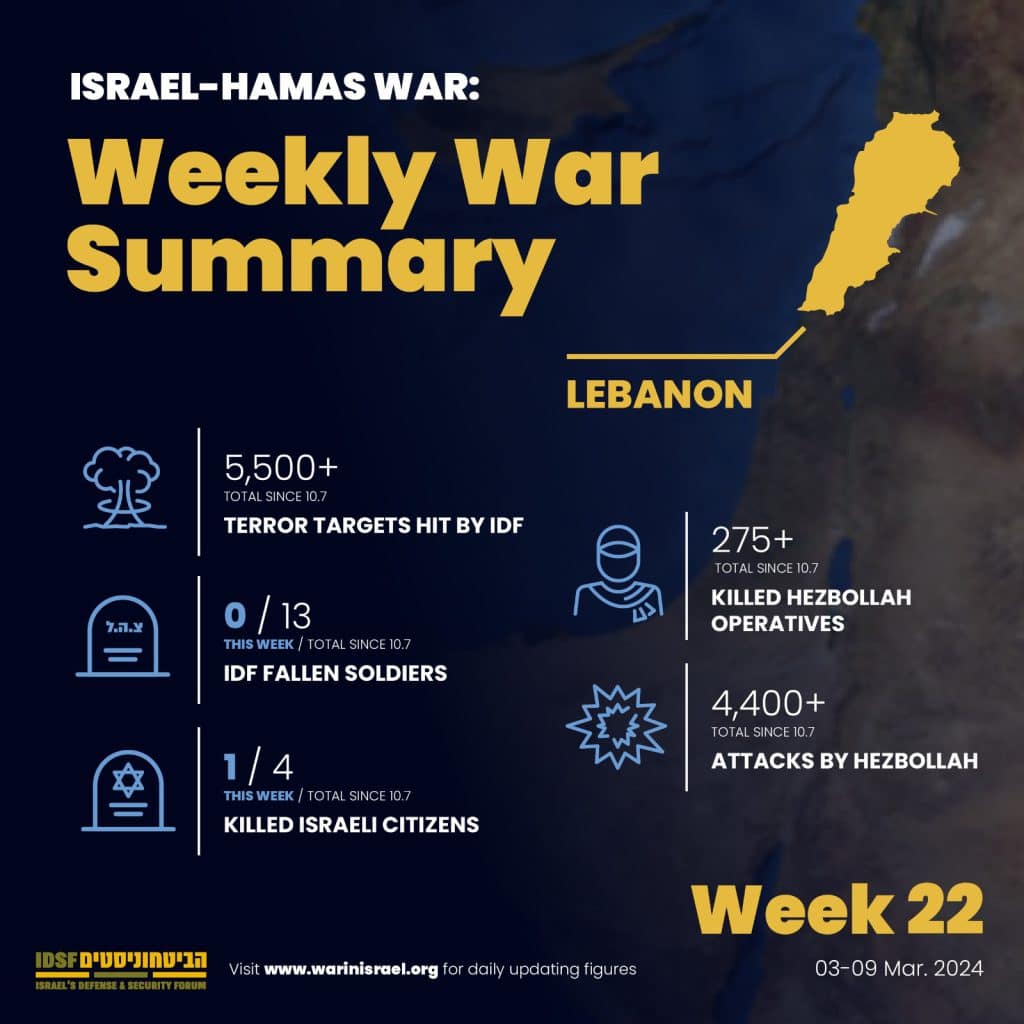
Lebanon
Operational
- IDF Chief of Staff Herzi Halevi instructed the IDF to prepare offensive plans for an extended war in the North. Halevi asked retired IDF commander, Moshe Tamir, to create a plan to push Hezbollah 8-10 KM from the border.
- Continued exchanges on the border with Hezbollah shooting anti-tank missiles and rockets, mortar shells and utilizing UAVs. The IDF shot down a drone that crossed the border and later retaliated with airstrikes on Hezbollah terrorist infrastructure.
- Hezbollah launched barrage of about 30 rockets and anti-tank missiles at Kiryat Shmona and the Upper Galilee.
Diplomatic
- A Lebanese newspaper published that the target date for a diplomatic settlement is March 15th, otherwise Israel would escalate the tensions.
- After visiting Lebanon, the American Special Envoy Amos Hochstein arrived in Israel and met with Defense Minister Gallant. Gallant emphasized to him that the ceasefire and the issue of hostages in Gaza should not affect the situation on the northern front, where Hezbollah is supposed to withdraw northward to the border in accordance with UN Resolution 1701, and that Israel is close to a decision point due to Hezbollah’s continued attacks.
- Na’im Qassem, Hezbollah’s deputy secretary general, said they were not involved in the messages conveyed by American mediator, Amos Hochstein, as he was in contact with Lebanese government officials and that Hezbollah was not involved. He added that Hochstein’s remarks added nothing because Hezbollah’s position was clear: as long as the war in the Gaza Strip continued, their front in Lebanon will continue, and the organization’s decision was that no discussion of the situation in south Lebanon should be held until after the end of the war in the Gaza Strip. He noted that they were not close to an all-out war in Lebanon, but at the same time, they were prepared for any possibility
- Najib Mikati, Lebanon’s interim Prime Minister, said everyone was working to calm the situation on the south Lebanese border and achieve long-term stability. He said the information indicated that there would be a ceasefire in the Gaza Strip before the month of Ramadan and that negotiations would be held with them during that month. According to him, Amos Hochstein, presented a proposal, which was now being examined by Nabih Berri, the Speaker of Parliament.
The mediation with Lebanon has failed; Hochstein and his representative in Beirut have left the Middle East and announced the suspension of all talks related to a ceasefire. Hezbollah is preparing for war; they are aware of the discourse in Israel, aware of the IDF’s preparations, and all that remains is for each side to calculate when the right time is to engage in conflict.
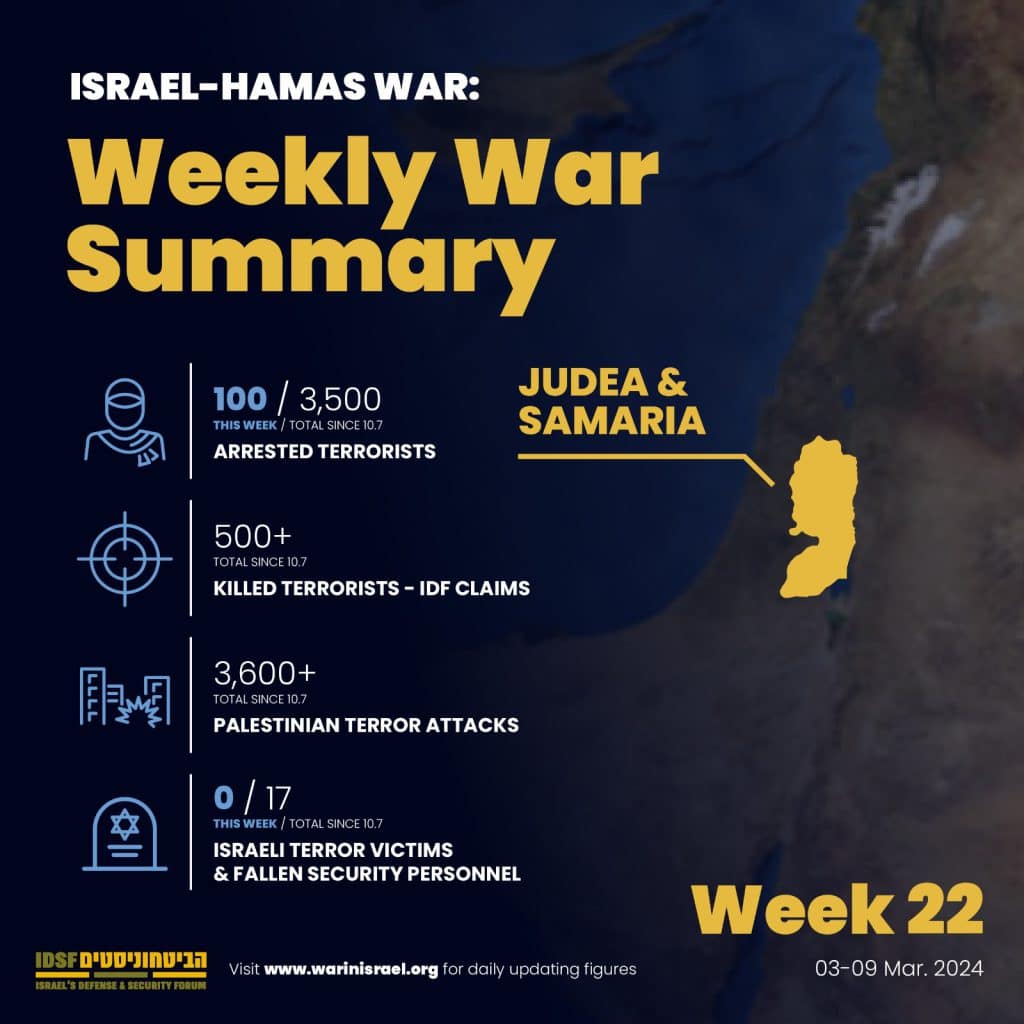
Judea and Samaria
- Hamas and other Palestinian factions are calling for Jihad during Ramadan, capitalizing on the religious sentiment that brews during this time in the Muslim calendar. Hamas’ strategy is to widen the war into Israel and Judea and Samaria through terrorist attacks.
- Outgoing PA Prime Minister, Mohamad Shtayyeh, said in an interview with CNN that after the PA government’s resignation, that a new opportunity has arisen for Palestinians to unite so that the PA would control all Palestinian territories, including the Gaza Strip, Judea and Samaria, and East Jerusalem as their capital. According to him, they are in contact with the international community, including Saudi Arabia and the United States.

The Start of Ramadan and Ascent to Temple Mount (Al Aqsa Mosque)
Netanyahu reversed his position on issuing limitations to Arab Israelis going to the Al Aqsa Mosque during Ramadan which begins on March 10th. The Israeli government ordered police to allow the same worship conditions at the al-Aqsa Mosque as in previous years and to limit the number of worshipers only on the basis of public safety considerations to avoid a stampede. Netanyahu accepted the IDF’s and Shin Bet’s position and decided not to issue limitations regarding the ages of worshipers amid fears of violent rampages during the month. The IDF intelligence chief along with other security officials have warned that limitations imposed on Israeli Arabs would instigate social unrest and help Sinwar in his attempt to unify Muslims against Israel. Netanyahu has said earlier during the week that Israel’s policy was and will remain to allow freedom of religion for all religions in Ramadan and during other times.
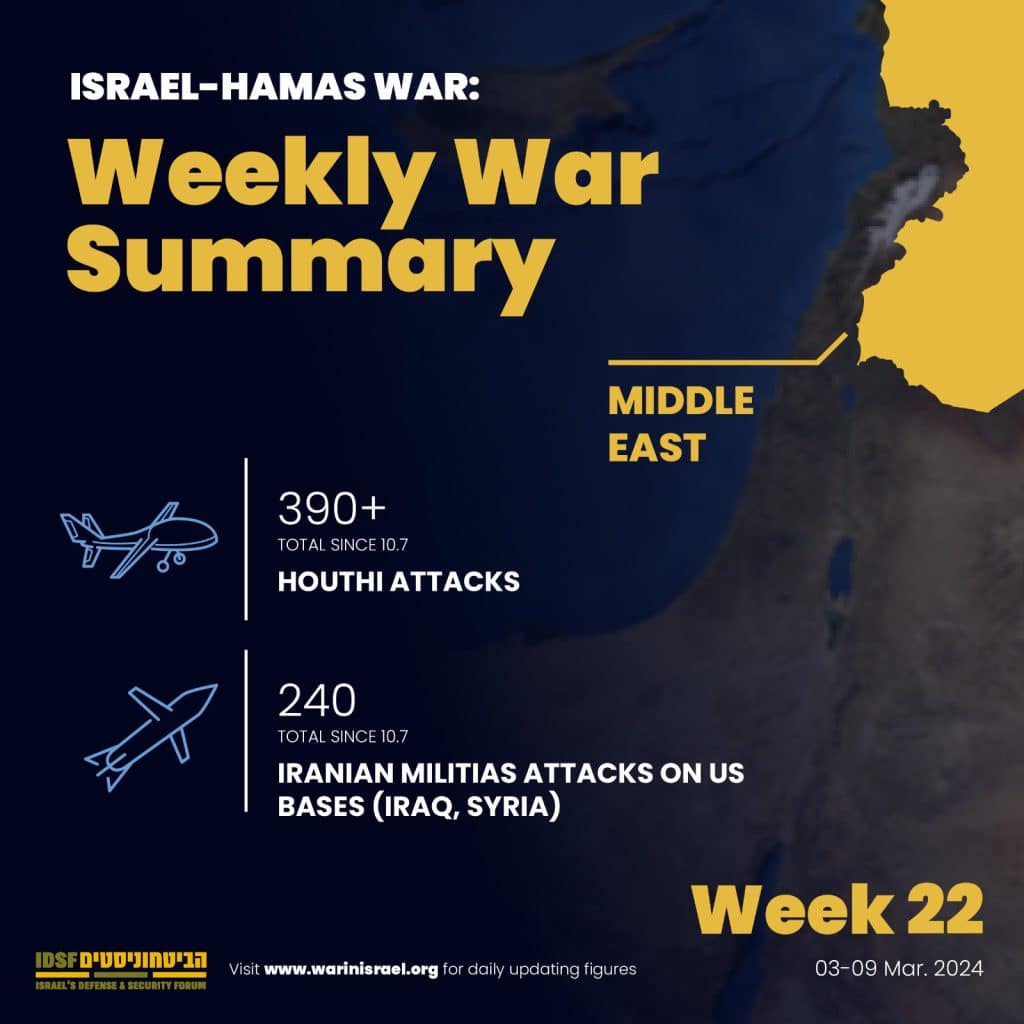
Iraq and Syria
- The Shia militias have not attacked American forces for over a month. US CENTCOM commander said that they have been deterred after the American retaliatory strike that took place after the 3 American soldiers were killed by the militias.
- The Islamic Resistance in Iraq claimed that it conducted two drone attacks targeting Israeli military and civilian infrastructure in Haifa and in the Golan Heights. The IDF reports no evidence of an attempted attack.
- The Iraqi Popular Mobilization Forces (PMF)-controlled Muhandis General Company signed a memorandum of understanding (MOU) with the Chinese National Machinery Industry (SINOMACH). The MOU encompasses reconstruction, engineering, trade services, and energy-related projects across multiple Iraqi provinces. SINOMACH is a Chinese state-owned company whose business activities encompass heavy machinery manufacturing, overseas infrastructure construction, and financial services.
Yemen
- US CENTCOM conducted preemptive strikes targeting two Houthi mobile anti-ship missiles in Houthi-controlled Yemen.
- The Houthis separately fired naval missiles at Singapore-flagged, owned, and operated vessel M/V Propel Fortune in the Gulf of Aden.
- During a Senate Armed Services Committee Hearing on March 7, CENTCOM commander Gen. Michael Kurilla said that US forces have not deterred the Houthis. Kurilla added that in his estimation, the United States will need to impose a “cost” on Iran to stop the Houthis from continuing attacks. Kurilla highlighted the importance of targeting Iran’s ability to resupply the Houthis

Iran
- In a KAN 11 report, the Iranian Red Crescent sent aid to Gaza through Egypt. There are Iranian flags next to aid stations in Gaza.
- In a summit organized by the Organization for Islamic Cooperation Hossein Amir Abdollahian, the Iranian Foreign Minister, met in Jeddah with the Saudi Foreign Minister, Faisal bin Farhan. Abdollahian stated in the meeting that Iran expects that the emergency meeting of the foreign ministers of the Islamic countries in Jeddah will lead to steps supporting the Palestinians and to end the massacre of the Palestinians.
- IRGC commander Qaani has said that Iran is willing to extend the war and use its proxies to dictate the pace of the war. This happened on the same day that the Houthis fired missiles at a ship traveling from China to the port of Jeddah in Saudi Arabia, resulting in casualties for the first time (3 sailors killed and 6 injured). On March 3rd, a British ship was sunk in the Red Sea several days after the Houthis attacked it and the crew abandoned the ship. This was the first ship they sank.
- Iranian military and security leaders are increasingly discussing the need to expand the Iranian military presence around the Red Sea and Mediterranean Sea. Major General Yahya Rahim Safavi—a senior military adviser to the Iranian supreme leader—stated on March 6 that the Islamic Revolutionary Guards Corps Navy and Aerospace Force should “focus” on the Red Sea and Mediterranean Sea. Safavi described the Mediterranean Sea as part of Iran’s strategic depth and that Tehran must accordingly “increase [its] strategic depth [by] 5,000 kilometers,” which would extend to the Strait of Gibraltar.
Western media reported on March 3 that Iran requested Sudanese permission to establish a permanent naval base on the Red Sea, which would support Iranian out-of-area naval operations and attacks on international shipping.

